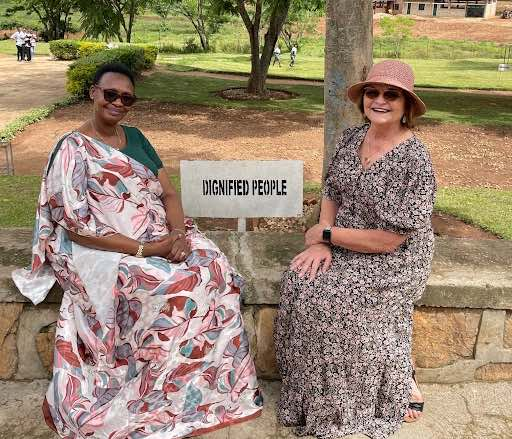
“Business speaks about return on investment, but the greatest return on investment is to invest in people,” said Ann Pretorius, co-founder of the continent’s largest indigenous non-governmental organisation, ForAfrika (formerly JAM).
She was speaking at the official handover ceremony of the Fred Nkunda Life Centre in the Shyogwe Muhanga district in Rwanda on 25 November. The centre was previously an orphanage, built by ForAfrika in partnership with Life Outreach International and multiple donors from around the world, shortly after the 1994 genocide which left thousands of displaced children in its wake.
It is now a Technical and Vocational Education and Training (TVET) college, teaching marketable skills to young people. Doreen Nkunda, another of the orphanage’s original co-founders, will officially take over the reins.
“This project started with traumatised parents and heartbroken children who were displaced from their families, but it has some happy endings,” said Pretorius, who was reunited at the ceremony with Nkunda and hundreds of the children they had cared for.
Nkunda shows no outer signs of having raised more than 10,000 children over the past 27 years, but she and her late husband Fred started taking care of children shortly after the 1994 atrocities.
At the same time, South Africans Ann and Peter Pretorius were raising funds to assist those who had fled the country. On a visit, Peter and Fred met serendipitously and decided to do all they could to care for these children, including building an orphanage together.
“We took hands with James and Betty Robison through Life Outreach and many donor partners around the world who assisted us in building this project through our ‘Buy-a-brick’ project. We started taking care of the children and with the co-operation and support of the Rwanda government, we were given this land,” said Pretorius.
The late Peter wrote in his memoirs: “We provided work opportunities and skills development as teams hand-manufactured bricks from local clay alongside the nearby river. Thirty-seven widowed ‘mothers’ took care of the everyday needs of the children, while other staff maintained the property, prepared meals and assisted in daily recreational activities.”
Doreen recalls those early days, while standing next to two enormous pots in the kitchen.
“People would bring the children to us,” she says. “I just kept thinking: ‘if this were my child…’ and I knew I had to be a mother to them.”
She was forced to do it alone when her husband died suddenly about a year after the centre was built. It was named the Fred Nkunda Life Centre in his memory.
All these years later Doreen has no intention of stopping her life’s work.
One of her “children”, Emile Morane, spoke at the ceremony: “We, your children and grandchildren are an impact or successful love story that you wrote… [taking us] from nowhere to somewhere today… You saved our lives and now we are also saving more lives and ensuring skilled and entrepreneurial Rwandan youth.”
“The transition from an orphanage to a skills training centre was an important step,” Pretorius said at the ceremony. “We learnt the importance of building for tomorrow, not just for today. And so, hundreds of young students are being trained in skills development, with some already owning their own businesses. We now celebrate this next transition as we hand over the centre to Doreen Nkunda and her national Rwandan NGO, a great example of true longevity and sustainability.”
ForAfrika will officially take leave of the centre but will remain in Rwanda to assist its most vulnerable communities through various programmes.
Working with home-based care groups for young children, ForAfrika is establishing community vegetable gardens, renovating early childhood development (ECD) centres (also known as pre-schools) and training Village Savings and Loans Associations. The latter are groups of community members who together save money, assist each other with loans and are then able to gain access to financial institutions.
ForAfrika has already assisted 78 such groups in the Muhanga and Kamonyi districts of Rwanda’s Southern Province. The organisation has renovated three pre-schools, provided ECD teacher and child caregiver training, established community vegetable gardens and delivered essential nutritional and agricultural training.
“The dream continues. Developing people never ends,” concluded Pretorius.
ForAfrika is the largest indigenous African non-governmental organisation working for an Africa that thrives. Partnering intimately with our communities, ForAfrika brings resources and implements programmes that are locally led to address the barriers people face, leading to equitable growth and transformation. (End)
